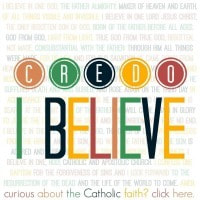|
I’ve always struggled with the story of Martha and Mary. The usual interpretations of this story in Scripture have never quite satisfied. I understand that Jesus is inviting Mary into a closer relationship with him when he acknowledges her place, sitting at her feet. This, in and of itself, was radical, as typically only men were permitted to assume the posture of a disciple by sitting at the feet of their rabbi, and Jesus extends this privilege to Mary. This is a great honor for Mary, but it makes the contrast between her and Martha even more noticeable.
If Mary is sitting at the feet of Jesus, listening to his word, learning from him and growing in her relationship with him, then who is going to take care of all the people in the house? It’s unlikely Jesus and his followers are going to help. Perhaps there were some other women who were in the group. Maybe they could lend a hand. But then again, that means they, like Martha, are tasked with the kitchen duties and miss out on visiting with Jesus. Martha herself seems a bit resentful that she is doing all the work. In fact, scripture states she was “burdened with much serving.” Martha says to Jesus “Lord, do you not care that my sister has left me by myself to do the serving? Tell her to help me.” But Jesus merely replies. “Martha, Martha, you are anxious and worried about many things. There is need of only one thing. Mary has chosen the better part and it will not be taken from her” (Luke 10:42) Is Jesus inviting Martha to join her sister and listen to him, to sit at his feet? Are the needs of hospitality, a tremendously important aspect of ancient Judaism, simply to be postponed or even ignored? Scripture doesn’t say. And how are we to apply this teaching of the Lord in the midst of our own responsibilities and busy days? I was pondering the story of Martha and Mary recently, as it seems especially appropriate now, during the 40 Day Lenten journey. I took another look at this Scripture, hoping to find some inspiration. The Return of the 72 The Martha and Mary story is described in the Gospel of Luke, Chapter 10, verses 38 to 42. But earlier in that same chapter 10, in verses 17 to 20, Luke describes the “return of the 72”, when the disciples that Jesus had sent out, two by two, to preach his word and prepare his way, return triumphantly to report on their missions. Scripture says the disciples were rejoicing, saying that “Lord, even the demons are subject to us because of your name.” (Luke 10:17) Jesus responds to this good news by saying “I have observed Satan fall like lightning from the sky.” The footnote given to Jesus’ statement reminds us that as the kingdom of God is being established, the evil spirits in power on earth are being overthrown. The “dominion of Satan over humanity is at an end.” Jesus, solely through the power of his word, is vanquishing our common enemies. It is soon after this conversation with the 72 that Jesus enters the home of Martha and Mary. He finds Martha struggling with one enemy in particular, the spirit of Acedia. Often referred to as Sloth, the vice of Acedia is one of the Big Seven Vices, along with Pride, Gluttony, Wrath and the rest. Although we sometimes refer to Acedia as Sloth or laziness, that description is not quite correct. Acedia is not about sleeping in or not doing the dishes. It is often called the “noon-day devil,” because it shows up at the hot noon hour when the sun is high in the sky, tempting us towards restlessness, distraction, boredom and lack of attention. It makes the spiritual things seem unreal, unimportant and even unwanted. It manifests in either despair, depression and feeling overwhelmed, on the one hand, or being a workaholic, staying busy performing an endless number of tasks, on the other. Jesus names both of these conditions in Martha. He tells her that she is “worried and anxious,” one of the signs of acedia, and we know she is also engaged in a hundred tasks around the house, a symptom of the other side of acedia. Jesus speaks his word to her, “There is need of only one thing.” Jesus doesn’t tell Martha to stop doing everything. He says she just needs to do one thing, to listen to him, to seek the kingdom he has come to inaugurate. He gives her his word to overcome Acedia. Now that we are close to halfway through Lent, maybe our original fervor of walking with Jesus is wearing off. Maybe we don't feel those spiritual goals are all that necessary or attainable anymore. Are we trying to do too much - or could we be struggling with Acedia? Overcoming Acedia The virtue that overcomes Acedia is Diligence; remaining focused, calm, careful and persistent while believing that the work we do is meaningful and will be fruitful, especially spiritual work. Moving out of Acedia into Diligence requires discernment, prayer and effort. It takes prudence to know "what is necessary" and what we can put to the side. I find this approach helpful, a way to navigate out of the belief that 1. I have to do everything or 2. What I do doesn’t make any difference anyway. As I journey through Lent this year, I’m going to pay more attention to any feelings prompting me to either give up or add an undue number of Lenten practices or other activities and remember that only one thing is actually required. Especially if I happen to feel this way in the noon-day hour.
0 Comments
Leave a Reply. |
The BlogDisclaimer:
The images on this website are either my own or are used under the Creative Commons license. No images have been edited, shared, or adapted. A link to each work that I do not own is provided at the bottom of the page. CC License: Archives
March 2024
Categories
All
|




 RSS Feed
RSS Feed
